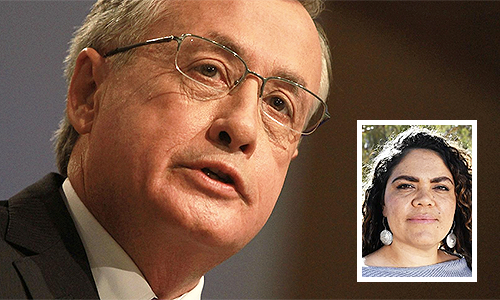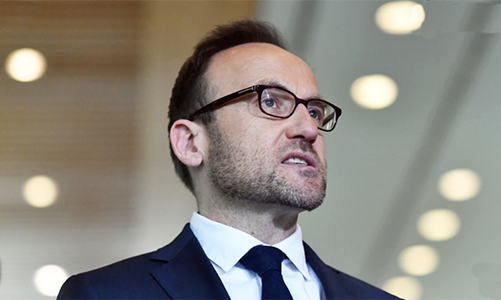
by PAUL COLLITS – ONE of Australia’s least competent former federal treasurers, Wayne Swan, has described Senator Jacinta Price’s ground-breaking National Press Club address last week as “bizarre”.
What Price said, echoing her mother Bess Price’s recent argument in Quadrant and Nigel Biggar’s in his book Colonialism, A Moral Reckoning, was that Aboriginal life before European settlement wasn’t a bed of roses.
- Wayne Swan has proven to be an ideologue and serially offending dullard.
- Jacinta’s real-world experiences triggered a spray of sanctimonious twaddle from one of Australia’s worst ever treasurers.
- Simply put, Swan is a denier of industrial revolution “benefits”.
She added that colonialism had led to benefits, enduring benefits, for Aborigines. Which probably far outweigh its well reported costs.
As reported in The Senior: “LNP senator Jacinta Nampijinpa Price has warned the Voice would divide the country, using a speech at the National Press Club to say the gap between Indigenous and non-Indigenous Australians was not caused by systemic racism.
TRAUMA
“She also rejected suggestions that the colonisation of Australia by the British had a negative impact on Indigenous people, resulting in intergenerational trauma.
“ ‘There is no ongoing negative impacts of colonisation’,” she said on Thursday.
“ ‘If we keep telling Aboriginal people they are victims, we are effectively removing their agency and then giving them the expectation that someone else is responsible for their lives’.”
This is not rocket science. Yet saying it out loud now elicits a spray of sanctimonious twaddle from one of Australia’s worst ever treasurers and apparent fear of the mob on the part of Peter Dutton, who declined to endorse Price’s central claim.
I wonder if Wayne Swan has ever heard of Deirdre McCloskey. Since he was a treasurer and McCloskey is an economist, it is possible, though unlikely.
McCloskey self describes: “… as a ‘literary, quantitative, postmodern, free-market, progressive Episcopalian, Midwestern woman from Boston who was once a man. Not ‘conservative’! I’m a Christian Classical Liberal.”
McCloskey is famous for a number of things. One is her thesis about bourgeois dignity, expounded in a three-volume tome on the subject written a decade or so ago.
At a seminar hosted by The Liberty Fund in 2014 on McCloskey’s core thesis, it was noted: “The key issue is to try to explain why ‘the Great Enrichment’ of the past 150 years occurred in northern and western Europe rather than elsewhere, and why sometime in the middle of the 18th century.
INSTITUTIONS
“Other theories have attributed it to the presence of natural resources, the existence of private property and the rule of law, and the right legal and political institutions.
“McCloskey’s thesis is that a fundamental change in ideas took place which raised the ‘dignity’ of economic activity in the eyes of people to the point where they felt no inhibition in pursuing these activities which improved the situation of both themselves and the customers who bought their products and services.”
This is a great summary of McCloskey’s work. And note that she doesn’t see the great contribution of the capitalist revolution to humanity as simply a matter of material gain.
We can argue about whether McCloskey’s explanation of the why then, why there, emergence of the capitalist revolution is better than, say, that of Max Weber in The Protestant Ethic and the Spirit of Capitalism, or of Joel Mokyr in his books, The Enlightened Economy (2011) and A Culture of Growth: The Origins of the Modern Economy (2016).
On Weber, we have this: “In the book, Weber wrote that capitalism in Northern Europe evolved when the Protestant (particularly Calvinist) ethic influenced large numbers of people to engage in work in the secular world, developing their own enterprises and engaging in trade and the accumulation of wealth for investment.”
RADICAL
Joel Mokyr’s pitch is as follows: “Mokyr argues that modern economic growth depended on a set of radical changes in beliefs, values, and preferences – a set to which he refers collectively as ‘culture’ – and that the cultural foundations for modern growth were laid in the period from 1500 to 1700.”
There are other explanations for why, after thousands of years of stagnant economic activity, suddenly we had a few hundred years of untrammelled growth (save for the odd depression).
What is beyond argument is that the growth occurred, to the overall, massive benefit of humankind. Recognising this doesn’t make you an unreconstructed Whig historian – endless progress, and all of it good – nor should we take seriously the greenie goons who deny the benefits of economic progress, and who would have us (in fact, are having us) booted back to the stone age.
Lenin correctly described imperialism as the highest form of capitalism. Again, this is, or should be, uncontroversial.
Colonialism occurred (by and large) as a result of capitalists and their governments searching for new markets and sources of raw materials for industrial production at home.
There was also the Christian imperative – go and teach all nations – and the crime imperative.
My own great, great, great grandfather was a convict transported down under in 1801. An involuntary colonialist, you might say. (He, too, later became a capitalist and opened an Inn, whose bicentenary is to be celebrated shortly).
Noting that the benefits of capitalism and of colonialism are not pure and not evenly distributed, one can easily conclude, nonetheless, that they have been, on balance, for the overall good of those who have been touched by them.
DIGNITY
The industrial revolution, as McCloskey has recognised, has brought dignity as well as internal plumbing.
For Aborigines, denied by their isolation – their very own tyranny of distance – the opportunities for innovation provided (often accidentally) by close proximity to new ideas and the system metabolism that allows rapid absorption of those ideas, exposure post-1788 to the fruits of the industrial revolution and the dignity revolution it unleashed, has proven no less substantial than it has for people of no colour.
And as the Prices point out with direct and deep personal knowledge, dignity was not something that we can assume existed in spades in Aboriginal communities prior to white settlement, nor (necessarily) since.
Except, that is, where Aborigines have been exposed to the opportunities for work and commerce provided in urban communities or by extractive industries in the regions.
You might even call it, politically incorrectly, their exposure to “civilisation”.
That colonialism allowed the benefits of material progress and the emergence of public dignity for all to be extended geographically from northern Europe and to all comers of whatever background or race or tribe, should be regarded as almost miraculous. Not a burden.
(As an aside, it is noteworthy and ironic that those who laud the benefits of endless mass immigration – surely an outsized act of rolling colonialism – not least of which they see as broadening our cultural outlook and bringing new ideas to the place, are not out there similarly championing the benefits of the first European migrants.)
This should be the end of the argument. But for the likes of Wayne Swan, ideologue and serially offending dullard that he is, the opportunity for untimely intervention provided by the Price ladies, mother and daughter, has proven to be too much of a temptation.
This is the wrath of the industrial revolution benefits deniers.
It is a shame that history, including economic history, isn’t taught anywhere anymore – including now, sadly, the Australian Catholic University as we learned this week.
If it were, then myriads of young and not-so-young minds would swoop on the likes of Swan and point out to him his utter foolishness.
Jacinta Price bizarre? A more reasoned assessment comes from one of The Australian newspapers band of short-form citizen journalists, aka the commenters.
This from Michael, in the Comments section to “All is not lost for the Indigenous Voice to parliament … yet” Simon Benson The Australian, September 15, 2023.
“Where was the silver service and the clanging of glasses of chardonnay at the National Press Club yesterday. It reminded me of the old story of I’m sorry there is no room in the Inn to give birth to our Saviour but you can use the stable out the back.
PROUD
“Well yesterday at the National Press Club Australia has been given a new Saviour, Jacinta Nampijinpa Price. If ever there was a message of the way forward for this country you only need to look at the picture of Jacinta’s proud parents.
“One white European one black and proud Indigenous, holding hands in unification and the pride they must be bursting with.
“What unification and a coming together they demonstrated through their support of their courageous daughter who is desperately and fearlessly trying to show the rest of Australia and the political class the way forward.
“This was real truth telling. The picture of those proud parents is the unification message this country needs and is worth a thousand words.
Perhaps Jacinta is not our Saviour, but she is a voice of reason and, dare one say it, a voice of the Enlightenment.
And, unlike Swan, someone who knows a little economic history.PC













So just how bizarre was three (or was it four ?, or seven ?, or ten ? – – – – -) budget surpluses that “I announce tonight” ?
Australian Aboriginal life among the 500-plus tribal groups that were scattered all over Australia, different languages and cultural beliefs, none of the benefits of advanced civilisations at the time the British First Fleet arrived in 1788.
Described as – nasty, brutish, and short.
Since colonisation in 1788, British Colonial Governments that formed into our Federation of States, Commonwealth of Australia in 1901, Indigenous people have become part of mainstream society and in 2023 around eight in every ten (80%) of them are not disadvantaged. Based on the population as a whole one in every six now live in poverty (down from one in every eight not long ago).
Senator Jacinta Prince is telling the truth.
Wayne is not a Swan; he’s a Goose.
It is hard too soar like an Eagle when surrounded by socialist Geese.